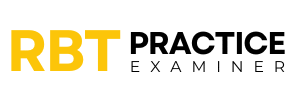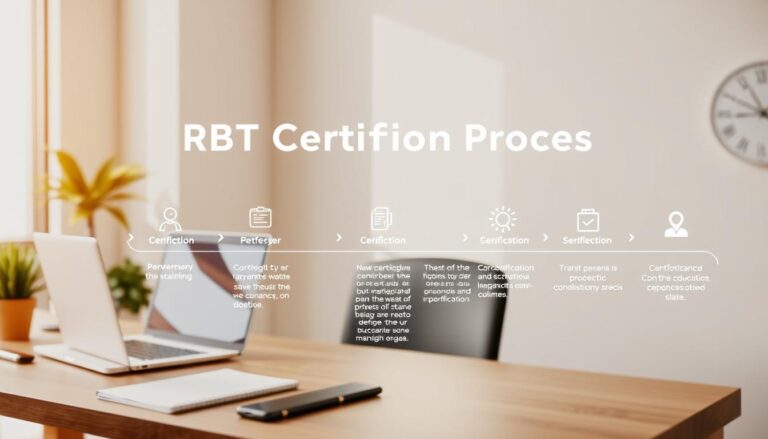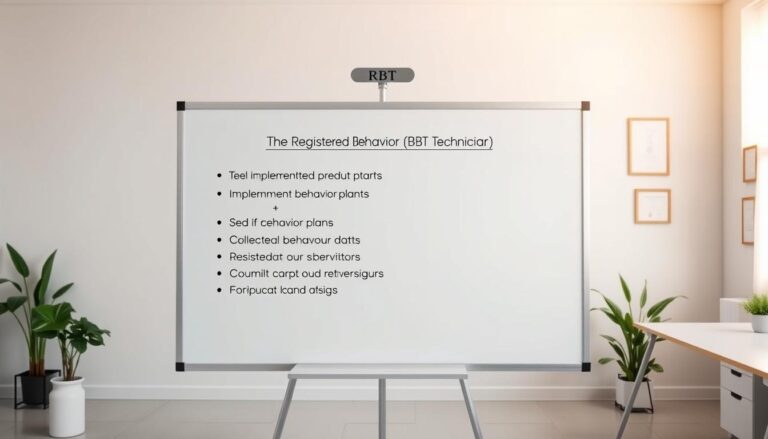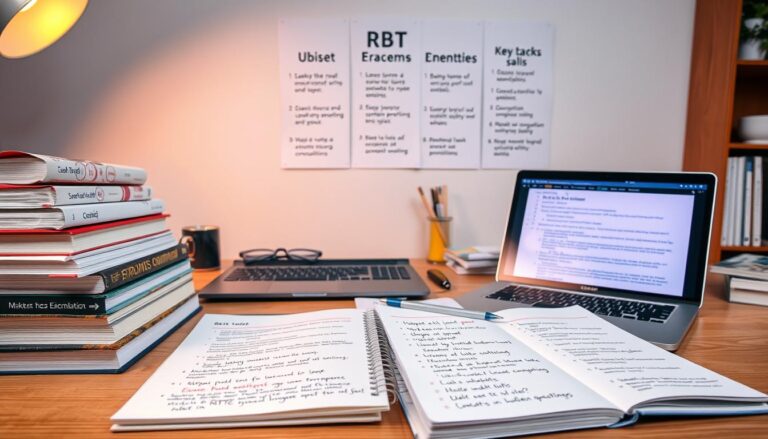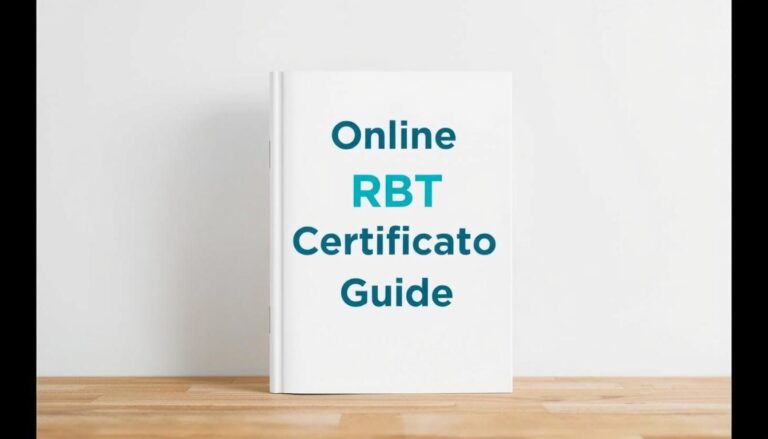Soft Skills for RBT Success: What You Need to Know
Registered Behavior Technicians (RBTs) are key in helping people with autism and developmental issues. They need both technical skills and soft skills to do their job well. Soft skills are just as important as technical knowledge in providing top-notch care.
The world of behavioral health requires more than just medical knowledge. RBTs use their soft skills to build strong relationships, handle tough emotions, and offer support to clients and their families. These skills are vital in creating a positive impact.
Improving these interpersonal skills can turn a good RBT into an outstanding one. Skills like communication, empathy, adaptability, and problem-solving are essential. They help technicians make a real difference in their clients’ lives.
Great RBTs know that technical skills are just the start. Being able to connect, understand, and meet individual client needs is what sets them apart. This demanding yet fulfilling job requires more than just technical training.
In our guide, we’ll dive into the key soft skills for success in behavioral health. We’ll share insights and strategies for RBTs to improve their skills and better serve their clients.
Understanding the Role of Soft Skills in RBT Practice
Registered Behavior Technicians (RBTs) are key in helping people with behavioral issues. They need technical skills, but soft skills are even more important. These skills are the base of good clinical work.
Soft skills for RBTs are more than just knowing the clinical stuff. They include many personal skills that affect how well clients do and how successful RBTs are.
Defining Soft Skills in Behavioral Health
Soft skills in behavioral health are complex personal traits. They help RBTs work well with clients, families, and colleagues. These traits include:
- Emotional intelligence
- Communication skills
- Empathy and patience
- Adaptability
- Problem-solving skills
Impact on Client Outcomes
The quality of an RBT’s soft skills really matters for client progress. Good communication and real compassion make a supportive space. This space helps clients learn and grow.
Professional Growth Opportunities
Having strong soft skills opens up bigger career chances for RBTs. RBTs who get good at these skills can move up to supervisory roles. They can also take on specialized tasks and lead in behavioral health.
Communication Excellence: The Foundation of RBT Work
Effective communication is key in behavioral health settings for RBTs. They need to use complex strategies that are more than just talking. Their job requires precision, empathy, and clear communication with clients, families, and colleagues.
Communication in RBT work covers many areas:
- Verbal communication with clients and their families
- Written documentation and progress reporting
- Non-verbal cues and body language interpretation
- Professional interactions with supervisors and team members
RBTs must learn nuanced communication techniques to meet client needs. They need to adjust language, use visual aids, and keep a supportive tone. Good communication means listening well, showing empathy, and explaining complex ideas simply.
Important communication strategies for RBTs include:
- Using clear, simple language
- Practicing active listening
- Providing constructive feedback
- Maintaining professional boundaries
- Documenting interactions accurately
Being good at communication is a must for RBTs. It affects how well clients do and how well RBTs work with others. By improving their communication skills, RBTs can make a bigger difference in behavioral health settings.
Emotional Intelligence for Behavioral Technicians
Emotional intelligence is key for Registered Behavior Technicians (RBTs) in complex settings. They need to understand emotions and control their own feelings. This helps them grow professionally and connect well with clients.
Self-awareness in Clinical Settings
RBTs must know their own emotions and what might upset them. This self-awareness helps them keep a professional distance while showing care. It also prevents burnout and keeps client support consistent.
- Recognize personal emotional patterns
- Identify possible stress triggers
- Develop ways to manage emotions
Managing Emotional Responses
Emotional control is vital for RBTs working with many clients. They must stay calm and professional, even when things get tough. Keeping emotions in check helps create a stable place for clients to grow and trust.
Building Client Rapport
Creating strong bonds with clients needs real empathy and emotional smarts. RBTs with great interpersonal skills build supportive relationships. This is key for successful behavioral changes.
- Use active listening skills
- Show real empathy
- Keep interactions professional yet caring
Soft Skills Required for RBT Success
Being a Registered Behavior Technician (RBT) is not just about knowing the technical stuff. It’s also about having the right soft skills. These skills are key to doing a great job in this tough but rewarding field. They help RBTs give top-notch behavioral intervention services.
There are several important soft skills for RBT success. These skills directly affect how well clients do and how well RBTs do their job:
- Emotional Intelligence: Getting and managing your own feelings while connecting with clients
- Patience and Empathy: Making places where clients can learn and grow
- Adaptability: Being able to change plans when things don’t go as expected
- Communication Skills: Talking clearly about complex things to clients and their families
To be successful, RBTs need to keep learning and growing. They must work on their people skills, too. These skills are just as important as the technical ones they learn.
| Soft Skill | Impact on RBT Performance |
|---|---|
| Active Listening | Helps understand what clients need and how they behave |
| Emotional Regulation | Keeps a professional attitude, even when things get tough |
| Problem-Solving | Creates new ways to help with behavior problems |
RBTs who get good at these soft skills make stronger connections with clients. This leads to better behavioral help and better results for clients.
Adaptability and Flexibility in Treatment Sessions
Successful behavioral technicians know that being flexible is key. They handle the ups and downs of behavioral health with ease. Being adaptable is not just a soft skill; it’s essential for quality care.
When faced with unexpected issues, behavioral technician soft skills really show. Clients with autism and developmental disorders need unique, fast-changing approaches.
Handling Schedule Changes
Disruptions happen often in behavioral health. Skilled RBTs have strategies to deal with these:
- Maintain a flexible mindset
- Create backup treatment plans
- Communicate proactively with supervisors
- Use calm redirection techniques
Modifying Approaches for Different Clients
Every client has their own needs and reactions. Successful RBTs learn to:
- Quickly assess individual client requirements
- Adapt intervention strategies in real-time
- Recognize when a current approach isn’t working
- Implement alternative engagement methods
Crisis Management Skills
Crisis situations require calm and professional judgment. RBTs must develop strong skills to:
- Remain calm under pressure
- Implement safety protocols
- Protect client and personal well-being
- Document incident details accurately
Mastering adaptability turns challenges into chances for growth and top-notch client care.
Professional Ethics and Boundaries
Keeping professional ethics is key for RBT job skills. Traits of a successful RBT include sticking to high ethical standards. These standards protect both clients and the professionals working with them. Trust in behavioral health settings is built on ethical conduct.
RBT professionals face complex situations. They must keep clear boundaries. These boundaries are essential for the client’s safety and the integrity of the therapeutic relationship.
- Respect client confidentiality
- Maintain professional distance
- Protect client autonomy
- Communicate transparently
Key ethical principles guide RBT practice. Understanding these principles helps avoid conflicts and ensures quality care.
| Ethical Principle | Practical Application |
|---|---|
| Confidentiality | Protect all client information from unauthorized disclosure |
| Informed Consent | Ensure clients understand treatment procedures and options |
| Professional Boundaries | Maintain appropriate personal and professional interactions |
| Competence | Practice within personal skill limits and seek supervision |
Ethical decision-making requires continuous reflection and professional development. RBT job skills go beyond technical skills. They include strong moral judgment and sensitivity in interactions.
Successful RBT traits involve recognizing and handling ethical challenges. This requires emotional intelligence, critical thinking, and a strong commitment to client well-being.
Time Management and Organization Skills
Time management is key for RBTs. They handle many tasks that need great organizational skills. Important skills include planning well, working efficiently, and paying close attention to details.
Good time management is more than just tracking hours. It’s about making plans to care for clients well and keep professional lines clear.
Session Planning Strategies
Good session planning is vital for RBTs. It helps them give consistent, quality help. Important strategies include:
- Preparing detailed session outlines in advance
- Creating flexible scheduling frameworks
- Allocating specific time blocks for different intervention activities
- Using digital scheduling tools for tracking client progress
Documentation Excellence
Accurate documentation is a must for RBTs. Using structured methods ensures:
- Accurate client progress tracking
- Clear communication with supervisors
- Legal and ethical compliance
- Comprehensive treatment record maintenance
Balancing Multiple Cases
RBTs often work with many clients at once. Strategic case management means prioritizing tasks, keeping professional boundaries, and giving personalized care to each client.
Successful RBTs use technology, create personal systems, and keep improving their time management. This helps them do well in their challenging job.
Building Effective Parent-RBT Relationships
Building strong bonds between Registered Behavior Technicians (RBTs) and parents is key to successful therapy. RBTs need great interpersonal skills to work well with parents. This teamwork is vital for better treatment results.
Good communication is the foundation of trust with parents. Important skills for RBTs include:
- Active listening
- Empathetic understanding
- Clear and transparent communication
- Cultural sensitivity
Parents are vital in the therapy journey. RBTs must show top-notch interpersonal skills to work well with families. They need to make a space where parents feel safe to share and help plan treatment.
| Communication Strategy | Key Objectives |
|---|---|
| Regular Updates | Provide transparent progress reports |
| Emotional Support | Validate parent experiences and feelings |
| Goal Collaboration | Involve parents in setting treatment milestones |
RBTs should meet parents with genuine respect and professional compassion. By focusing on open talks and showing their knowledge, RBTs can build strong bonds. These bonds help the child grow and support the family’s well-being.
Cultural Competency in RBT Practice

Developing cultural competency is key for RBT success. Registered Behavior Technicians need to understand and respect clients’ diverse backgrounds. This helps them provide care that’s tailored to each client’s needs.
RBT soft skills go beyond just knowing the technical stuff. Being culturally aware lets professionals build strong connections with clients from all walks of life.
Understanding Diverse Backgrounds
Good RBTs know that every client has their own cultural story. To understand these backgrounds, they use several strategies:
- Actively learning about different cultural traditions
- Acknowledging personal cultural biases
- Seeking opportunities for cultural education
- Respecting individual family dynamics
Culturally Sensitive Communication
Effective communication is all about being sensitive and adaptable. RBTs need to learn how to talk across cultural lines. This includes:
- Using appropriate language and terminology
- Recognizing non-verbal communication differences
- Listening without judgment
- Asking clarifying questions respectfully
Inclusive Treatment Approaches
Creating inclusive treatment plans is all about being flexible and culturally smart. RBTs should make sure their strategies fit with the client’s values and family traditions.
Cultural competency is not a destination but a continuous journey of learning, understanding, and growth in professional practice.
Problem-Solving in Clinical Settings
Behavioral technicians face many challenges that need great problem-solving skills. It’s key for RBT success in clinical settings. They must solve complex behavioral problems, not just fix simple issues.
RBTs need to develop important soft skills to tackle clinical challenges:
- Critical thinking to analyze behavioral patterns
- Creative approach to intervention strategies
- Adaptable decision-making processes
- Collaborative problem-solving techniques
The best RBTs use a systematic way to solve problems. Breaking down complex problems into manageable components helps target interventions better. This might include:
- Identifying the root cause of behavioral challenges
- Developing multiple solution strategies
- Implementing chosen interventions
- Monitoring and adjusting as needed
Good communication is key in solving problems. RBTs must work well with supervisors, families, and other healthcare professionals. They need to listen well, speak clearly, and consider different views.
Problem-solving in clinical settings is both an art and a science. It requires technical skills and emotional smarts. This makes it a vital part of successful behavioral interventions.
Team Collaboration and Professional Relationships
Successful Registered Behavior Technicians (RBTs) know that great client care comes from strong professional bonds. It’s key to have good RBT interpersonal skills for a supportive healthcare team.
Good team work needs more than just talking. It’s about respect, understanding, and working well together. RBTs must be good at working with supervisors, colleagues, and other teams.
Working with BCBA Supervisors
To have a good relationship with Board Certified Behavior Analyst (BCBA) supervisors, follow these steps:
- Keep communication open and clear
- Look for feedback to grow
- Show you’re committed to learning
- Ask questions about treatment plans
Inter-disciplinary Communication
Clear talk is key for RBTs working with different healthcare teams. This means:
- Listening well to others
- Sharing client info in a professional way
- Respecting different views
- Using clear and simple language
Conflict Resolution
Handling disagreements needs emotional intelligence and maturity. RBTs should solve problems together, staying calm and respectful.
Good RBT interpersonal skills make a better work environment. This helps clients and makes RBTs happier in their jobs.
Stress Management and Self-Care

Registered Behavior Technicians (RBTs) face unique challenges. They work with individuals who have behavioral needs. This job requires a lot of resilience and special skills.
Managing personal stress well is key. It helps RBTs keep their clients safe and happy. They need to take care of themselves too.
Self-care is essential for RBTs to keep going. They must find ways to protect their mental and emotional health.
- Practice daily mindfulness meditation
- Establish clear professional boundaries
- Engage in regular physical exercise
- Seek supervision and peer support
- Develop personalized stress reduction routines
Emotional resilience is very important for RBTs. They need to know when they’re getting too stressed. Then, they can take steps to feel better.
Workshops and counseling can help RBTs too. They should take care of their mental health as much as they care for their clients. This way, they can do their best work.
It’s important for RBTs to have a good work-life balance. By managing stress and having a strong support system, they can do well in their job.
Patient Advocacy and Support Skills
Registered Behavior Technicians (RBTs) are key in patient advocacy. They have skills that go beyond just technical knowledge. They support clients and families with care and clear communication.
RBT soft skills help build strong connections and support during treatment. Advocacy is more than just following plans. It’s about understanding and supporting each client’s unique needs.
Understanding Client Needs
Good advocacy starts with understanding and empathy. RBTs need to observe well to:
- Spot subtle behavioral signs
- Know how each client likes to communicate
- Find out what might stop treatment from working
- Make support plans that fit each client
Promoting Client Independence
Helping clients become independent is a big part of an RBT’s job. Supporting clients means teaching them to do things on their own. This includes:
- Breaking down big tasks into smaller steps
- Helping clients learn by themselves
- Celebrating small wins
- Lessening the need for direct help
Family Support Strategies
RBTs connect professional treatment with family understanding. They offer education, emotional support, and practical tips. This helps families deal with complex behavioral issues.
Good advocacy is about using knowledge and care together. It improves clients’ lives and outcomes.
Maintaining Professional Development
Professional development is key for RBT success. Registered Behavior Technicians need to keep learning to do well in their jobs. They must stay up-to-date with new research and methods to give the best care and grow their careers.
Success in RBT comes from actively improving oneself. Behavioral health workers can use many ways to learn more:
- Attend workshops and conferences
- Get advanced certifications
- Take online courses
- Join peer supervision and mentorship
- Read the latest in applied behavior analysis
Networking is also important. Meeting experienced people can teach you new ways and trends in behavioral health. RBTs who keep learning show they care about their job and can move up in their careers.
Focus on these areas for growth:
- Learn new behavioral techniques
- Use technology in treatment
- Improve cultural understanding
- Follow ethical standards
By always learning, RBTs stay ahead and help people with behavioral health issues better.
Active Listening and Observation Techniques

Learning to listen and observe well is key for RBTs. They need to understand client behaviors, not just what they say. These skills help them track progress and treat clients effectively.
Good RBTs know how to read client interactions deeply. They notice small cues that others might miss.
Non-verbal Communication Skills
Non-verbal signs are important in understanding behavior. RBTs must learn to read:
- Facial expressions
- Body language
- Emotional responses
- Subtle physical signals
Behavioral Assessment Accuracy
Accurate behavioral assessment needs a careful plan. RBTs must document and interpret client behaviors well. They use specific methods to:
- Collect objective data
- Use consistent evaluation methods
- Track behavior closely
Client Progress Monitoring
Monitoring client progress requires many skills. RBTs use special methods to track how clients are doing, including:
- Systematic data recording
- Regular performance assessments
- Collaborative feedback mechanisms
By improving these skills, RBTs can create tailored treatment plans. These plans help clients grow in meaningful ways.
Conclusion
Becoming a successful Registered Behavior Technician (RBT) is more than just knowing the technical stuff. It’s about having the right soft skills to care for clients and grow as a professional. These skills are key to building strong relationships and effective treatments.
The path to becoming an RBT is all about learning and growing. Traits like emotional intelligence, being adaptable, and good communication are essential. These help professionals work well in complex settings with care and accuracy. Staying committed to learning and following professional standards sets top behavior technicians apart.
Soft skills in behavioral health are not fixed; they need constant work to get better. By focusing on personal growth, RBTs can improve their work, connect better with clients, and make a bigger impact. The best behavior technicians use their skills to connect, understand, and support people with kindness and knowledge.
In the end, mastering these skills turns RBTs into real change-makers. They go from just providing services to making a real difference in people’s lives. Combining technical knowledge with strong interpersonal skills leads to better behavioral support and intervention.
